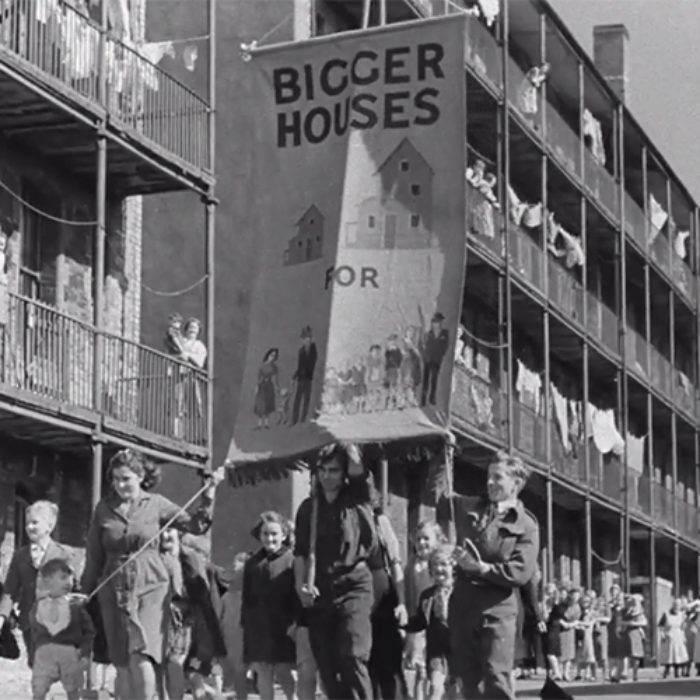Film

The Way We Live (1946)
Jill Craigie’s provocative documentary on the Abercrombie plan to rebuild Plymouth cleverly combines humour, melodrama and political polemic to stir up support for the architect’s radical proposal to re-design urban space and ensure housing meets the needs of families and young people.
Join Dr Sadie Wearing (London School of Economics), Dr Stephen Essex (University of Plymouth) and Dr Hollie Price (University of Sussex) for a discussion of Jill Craigie’s work on this fascinating film, and its significance as part of locally and nationally promoted ideas about postwar reconstruction.
Director: Jill Craigie
Cast: Peter Willes, Francis Lunt, Verena Chaffe, Patsy Scantlebury, June Riddolls
Running time: 64 mins
Venue: Plymouth Arts Cinema
Ticket information: £4 (no further discounts apply)
This screening is part of the Making the Grade: Women Directing Documentary, Past and Present Film Weekend, with several events taking place on Friday 22 and Saturday 23 November. This programme of events has been organised by the Arts Institute at the University of Plymouth and as part of the research project Jill Craigie: Film Pioneer, funded by the Arts and Humanities Research Council.
Directors UK (2018) reports an almost 10% decline in the number of women directing factual programming in recent years. What factors are driving this and how have individual women managed to forge careers in this sector?
We will use the career of Jill Craigie (1911 - 99) as a springboard to explore how far things have changed since she started as one of the UK’s first female documentary directors, with contributions from women film-makers from the South West and nationally. Jill Craigie directed a series of films in the 1940s including 'The Way We Live' (1946), a film which tried to foreground women's perspectives on the plan to rebuild Plymouth after the World War Two. After her success in the war and post-war period, she had few opportunities to direct again, until, propelled by anger at the fate of the people of Dubrovnik during the war in Yugoslavia, she made 'Two Hours from London' at the age of 84.
Visit The Arts Institute's event pages for more information.
Join Dr Sadie Wearing (London School of Economics), Dr Stephen Essex (University of Plymouth) and Dr Hollie Price (University of Sussex) for a discussion of Jill Craigie’s work on this fascinating film, and its significance as part of locally and nationally promoted ideas about postwar reconstruction.
Director: Jill Craigie
Cast: Peter Willes, Francis Lunt, Verena Chaffe, Patsy Scantlebury, June Riddolls
Running time: 64 mins
Venue: Plymouth Arts Cinema
Ticket information: £4 (no further discounts apply)
This screening is part of the Making the Grade: Women Directing Documentary, Past and Present Film Weekend, with several events taking place on Friday 22 and Saturday 23 November. This programme of events has been organised by the Arts Institute at the University of Plymouth and as part of the research project Jill Craigie: Film Pioneer, funded by the Arts and Humanities Research Council.
Directors UK (2018) reports an almost 10% decline in the number of women directing factual programming in recent years. What factors are driving this and how have individual women managed to forge careers in this sector?
We will use the career of Jill Craigie (1911 - 99) as a springboard to explore how far things have changed since she started as one of the UK’s first female documentary directors, with contributions from women film-makers from the South West and nationally. Jill Craigie directed a series of films in the 1940s including 'The Way We Live' (1946), a film which tried to foreground women's perspectives on the plan to rebuild Plymouth after the World War Two. After her success in the war and post-war period, she had few opportunities to direct again, until, propelled by anger at the fate of the people of Dubrovnik during the war in Yugoslavia, she made 'Two Hours from London' at the age of 84.
Visit The Arts Institute's event pages for more information.